Ties are the smallest yet, one of the most essential components of a man’s office wardrobe. A tie does a lot more than just decorate your neck and shirt: when people see you wearing a colourful, handmade silk tie, they’ll take notice of the fact that you went the extra mile, and will treat you accordingly.
Ties complete the appearance, add style to it and set the best apart from the crowd. Wearing a tie was a symbol of professionalism in the past and nothing has changed today in the formal sense but necktie is becoming more than just a business formal accessory.
There are various elements to consider while making the choice of what goes with what. Getting yourself a neckwear that is of the right proportion for your body and is of a colour and pattern that works well with your shirts, is the first thing. You want your ties which pair well your clothing — not just look good by themselves.
Here is a guide on how to match your tie and your shirt, according to different aspects.
How to pick the right tie according to the occasion
Formal

You might think wearing any kind of tie will make you appear professional, but that’s not always the case. In the tie game, we have so many different choices. It can be downright daunting sometimes. So what are the right colours for a job interview, business meeting or formal events?
For all these formal occasions colours should be neutral (black, grey, burgundy, mauve or blue). Concerning patterns, the choice can vary from solid ties, all over micro-pattern, stripes and well-balanced polka dots. Absolutely avoid novelty ties. Opt for silk ties with a little sheen, the perfect accessory for formal business settings. While still staying neutral, is a good way to vary your everyday formal look at work. For more of a casual business professional setting, a silk knit tie with weave pattern can also do the trick.
Casual
Ties are a good accessory at work even when your workspace allows casual dressing. Keep the cotton and knit ties for more casual occasions. Novelty ties are a great way of adding a dapper article to your clothing while still looking smart casual. They can easily be worn during the casual Friday or during the weekend, or while out at a casual party! Novelty ties in sensible patterns are often great conversation starters while allowing you to dress dapper & casual at the same time.
Dates
If you are going to a place where you think you should be wearing a tie like super chic restaurants or an art opening, or if it is one of the first dates and you’re dressed to impress, a silk tie is usually a good choice. It is an opportunity to make a good impression. Knit ties look much better with cocktail attire like a blazer and a pair of chinos. Keep colours sober for this one. But for the casual date night, patterned ties are great at portraying a more casual look without going over the line, maybe you can even choose even a novelty that expresses your mood.
Weddings
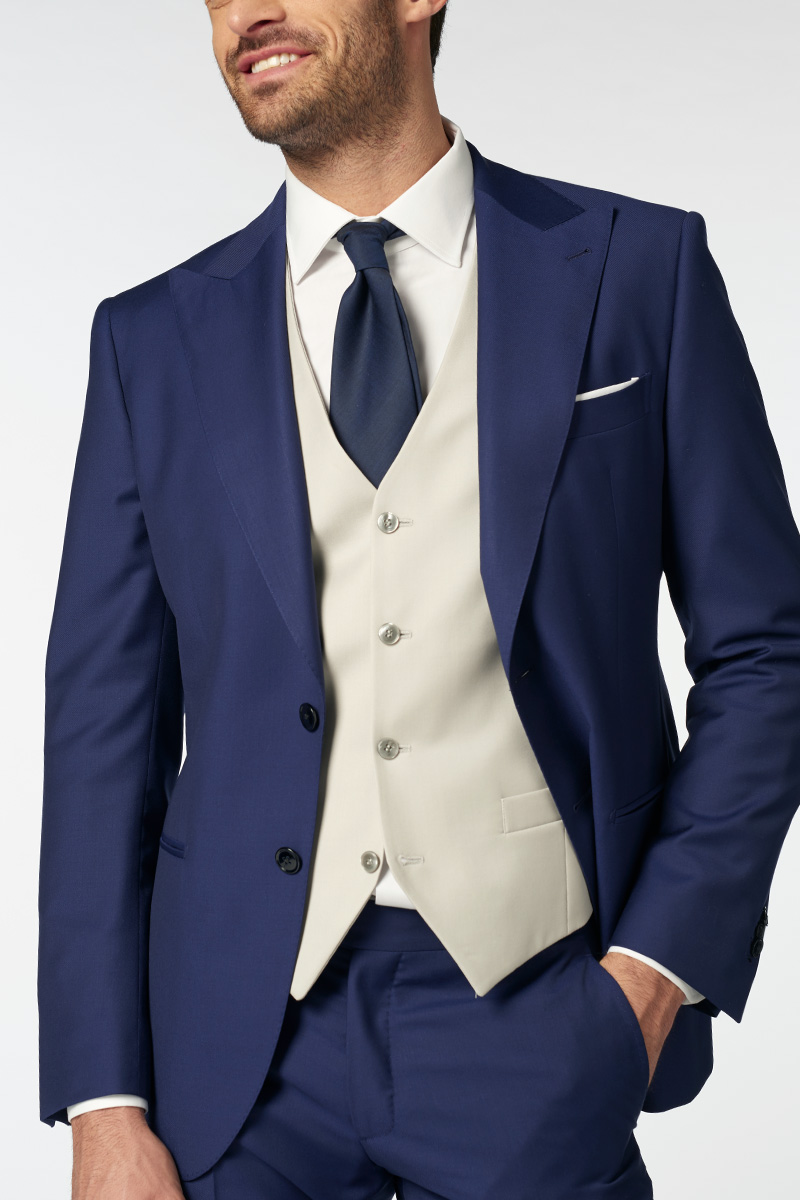
Subtle metallic colours and fabrics with shine are the perfect choice for day time weddings, but providing you are getting married in the evening, a darker coloured solid tie or patterned/abstract tie with a subtle design will make you very well presentable. If you can incorporate all of that while matching a tie to your bride’s gown, or incorporating colour elements of her gown in your tie, you will surely stand out and look elegant as a couple.
How to pick the right tie according to the season
When you are choosing a tie for different seasons, keep in mind the characteristics of different fabrics. Imagine the kinds of prints and colours are worn during those seasons. Let’s see below more in detail.
Summer ties
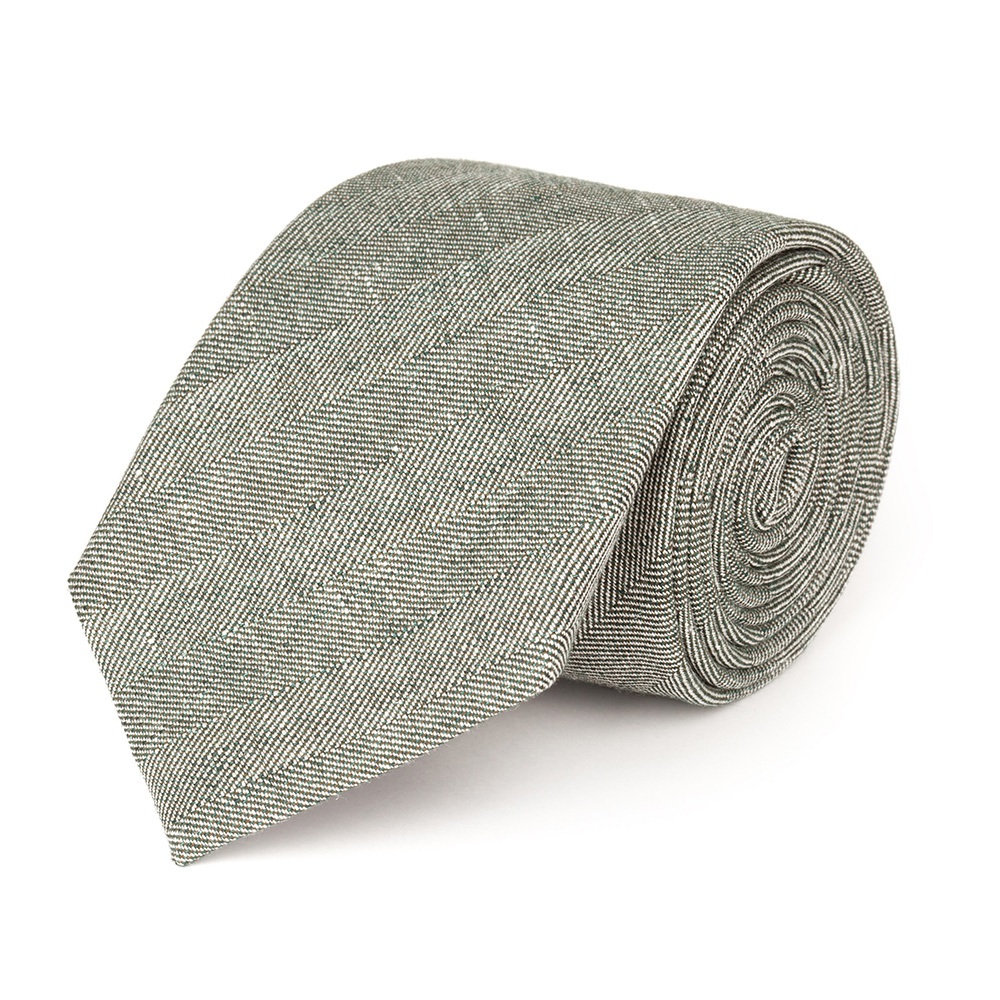
Cotton or linen ties should be reserved for Spring and Summer. Avoid wearing them with power business suits, and stick to more smart-casual tailored outfits. Silk is one of the few fabrics that can be worn year-round, depending on the colour and pattern.
Think about mixing-up your seasonal fabrics to give a look some variety and depth; for example, like a cotton shirt and linen tie. Summer tie colours include – Blue which is the most popular colour, navy, mustard yellow, pink, lilac and green. It is refreshing, lightens a darker suit. Multi-coloured ties in summer colours help you to stand out from the crowd and are usually attributed to young professionals. Some refreshing patterns are also welcome to lighten up a look, like mini polka dots and Regimental stripes. These summer ties are paired with the lightweight button-down shirts in cotton poplin or oxford.
Winter ties

A wool plaid tie is one of our must-haves of the season. Silk tie in dark colours and patterns like paisley with combinations of blue-green burgundy. Mustard yellow, olive green, burgundy or darker blue tie, dark greys, deep reds, and muted greens in wide straight or diagonal stripes. Plaids, solids, abstracts, dots and floral patterns tend to work really well with these colours. Patterns that work well for casual events are generally slightly more playful, and hence, we would go with a floral based tie that will provide an element of pop from a pattern standpoint. While a solid or striped tie can always fit the bill for more business formal occasions.
How to match a tie according to shapes
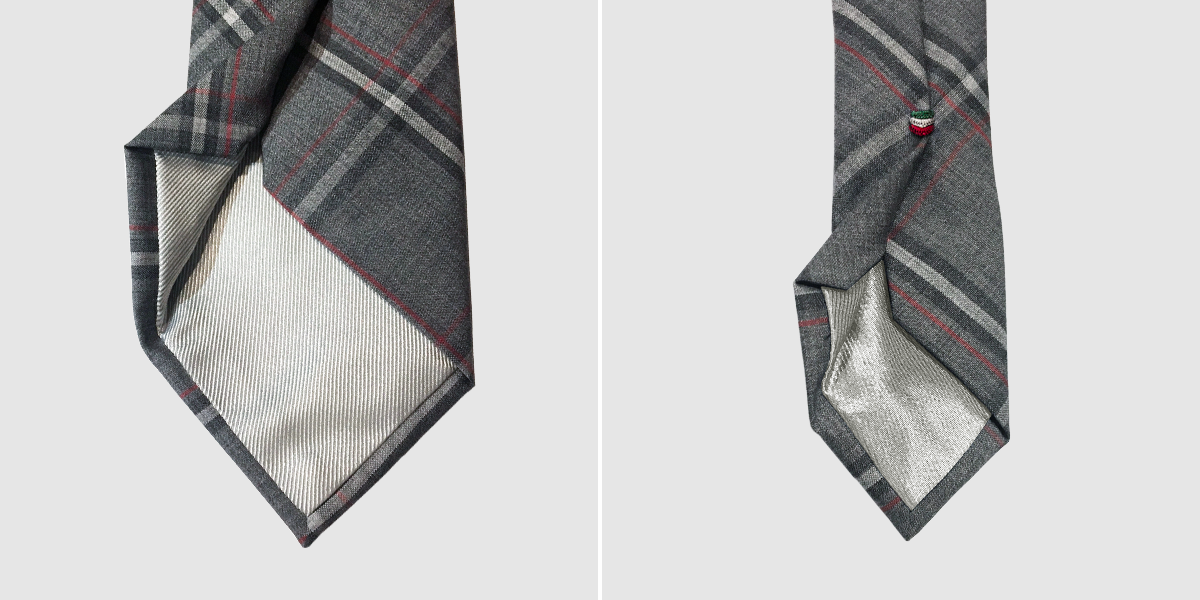
Skinny tie with which shirt
The skinny necktie is the one with a width of 1.5-2.5 inches. Skinny ties also often more casual than wider widths, it’s okay to pair them with non-dress shirts. Match a skinny tie with a classic oxford shirt with a slim fit. Skinny ties require a smaller shirt collar. You can wear a skinny tie to more relaxed working days or casual events. The best shirts collars have a medium to narrow collar spread. Also, button-down collar is less suited for narrow neckties. Skinny ties are best suited with a narrow, pointed collar and when tied with a four-in-hand knot, adding to their casual yet elegant nature! The shirts with large patterns are perfectly matched with a slimmer tie to keep a balance.
Wide tie with which shirt
Wide tie has the width between 2.25” and 3.25”. Men should always attempt to match the width of his tie to the width of his lapel. Wearing a wide tie with narrow lapels. The wide collars like the italian, french and extreme cutaway collar would look complemented with a wider tie. Wide tie looks perfect if you are going for a little mature and composed look. You can wear the wide tie with plain dress-shirts or with small patterns like thin stripes and almost invisible polka dots. Always remember that the proportion of tie width, the collar of the shirt or jacket lapels and shirt pattern should be well balanced.
How to match a tie according to colours
Neutral tone tie with which shirt
Neutrally toned tie like grey, beige, brown and khaki plain, striped or with some overall pattern, can be paired with a striped or gingham check shirts. Neutral tone knit ties seem to work best; their graininess bearing an earthen, organic feel adding a natural element to the noise of the pattern underneath. You can always opt for green, mustard, navy, charcoal or brown tie to win the office look– especially if the shirt is already playing the coloured card well. Due to the neutral allure of these colours combining them with a patterned shirt is a good idea. Pick out the colour of the stripes of the shirt and match it with one of the hues on the tie helps pull the entire look together. Keeping the colour of the shirt and tie of the same colour family, a more neutral minimalistic pairing that symbolises a certain level of sartorial sophistication.
Bold colour tie with which shirt
Ties in contrasting hues, so ties in shades of burgundy, electric blue, orange, green, pink or pale yellow and red also look great worn with the formal shirt. If you’re rocking a foundation shirt like a solid white or a solid light blue or pink, you can pretty much wear any colour solid tie you like. It’s a great way to make your outfit pop with a bit more colour. A bold coloured patterned tie on a micro check shirt in light or pastel coloured shirt. Determine the dominant colour in your shirt and look for a tie with some of that colour within the pattern. So for blue, look for a tie with orange micro-stripes, striped red or yellow but in a muted versions (not tangerine, please).
How to match a tie according to patterns
Patterned tie with which shirt
Polka dot neckties – A dark or neutral background with dots that reference the shirt colour looks fantastic. Contrasting textures or glosses can work well here, too: matte dots against a more reflective background are eye-catching without being overwhelming.
Foulard neckties – “Foulard” silk ties are just ties with a repeating, symmetrical pattern in neutral colours like royal blue, brown and burgundy, they can be worn with everyday dress shirt in checked, striped or plain shirt.
Paisley neckties- A muted, mid-toned shirt where a paisley tie can add some colour highlight. Regimental neckties- If you want to wear a striped tie with a striped shirt, then classic regimental ties are perfect! They have classic male colour combinations like green and blue together, red-blue-olive green etc, surely everyone can find one that suits their style.
Novelty neckties- they are the ties with an overall icon print. Wear them with a plain coloured or striped shirt that isn’t too busy. For example try a nautical print, the navy tie with your everyday white oxford shirt with blue stripes.
Stripe ties – Apart from regimental ties, there are other kind of striped ties with wide horizontal pattern, micro-striped pattern or multicoloured striped neck tie. Stripe Ties are more versatile than regimental ties, allowing them to be worn both in formal settings and in more casual settings. You can get in silk or silk knit, wear it with the most common plain shirt, micro-pattern shirt or mini checkered shirt, it is suitable for all seasons.
Plain tie with which shirt
Solid neckties are often fit for people with a more simple approach, but the reality is, they tend to go well with any shirt and look. If you are opting for a larger tartan, wide stripes, macro-checked or plaid shirt, the key is to pick out one of the more subtle base tones in the shirt with a solid, block-colour tie. Choosing a patterned shirt with a striking plain tie is surprisingly dapper, and creates a clean-cut look perfect for stylish gentlemen. Avoid it with a basic plain shirt.
How to match a tie according to fabrics
Silk tie with which shirt
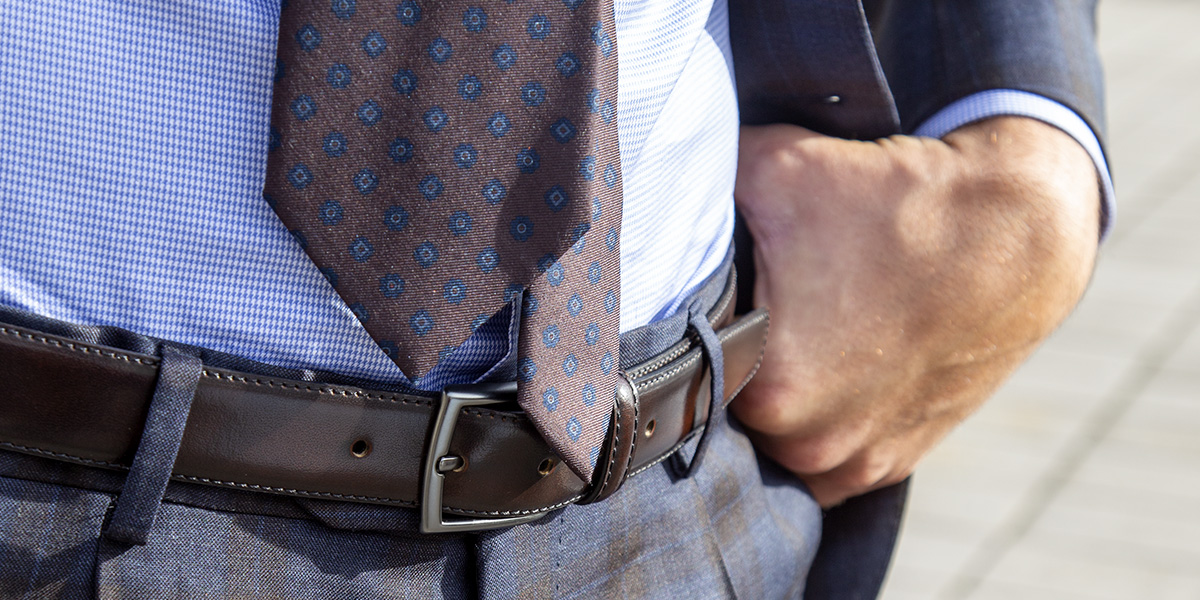
Aesthetically, silk happens to be a popular choice because of these many characteristics. Combined with its natural drape and feel, a silk necktie can be offered in both printed and woven silk, allowing for a range of designs, colours and textural variations. They are a great choice for an everyday plain dress shirt or with some pattern in cotton. Combine a plain or patterned silk tie with your office cotton flannel, oxford or dobby shirt. In winter silk tie can be a good choice for the office or special events with woollen shirts.
Cotton or linen tie with which shirt
Cotton tie is a perfect choice for summer to add some fresh texture to your look. Summer ties often come in light pastel colours and exhibit typical summer patterns such as vertical lines, delicate print and more playful polka dots. They can be combined with casual shirts and shirts which have a shine finish like easy iron and satin cotton shirts. Micro-design, checked or micro striped shirts in Muslin cotton and poplin go well with cotton ties as well.
Wool or cashmere tie with which shirt
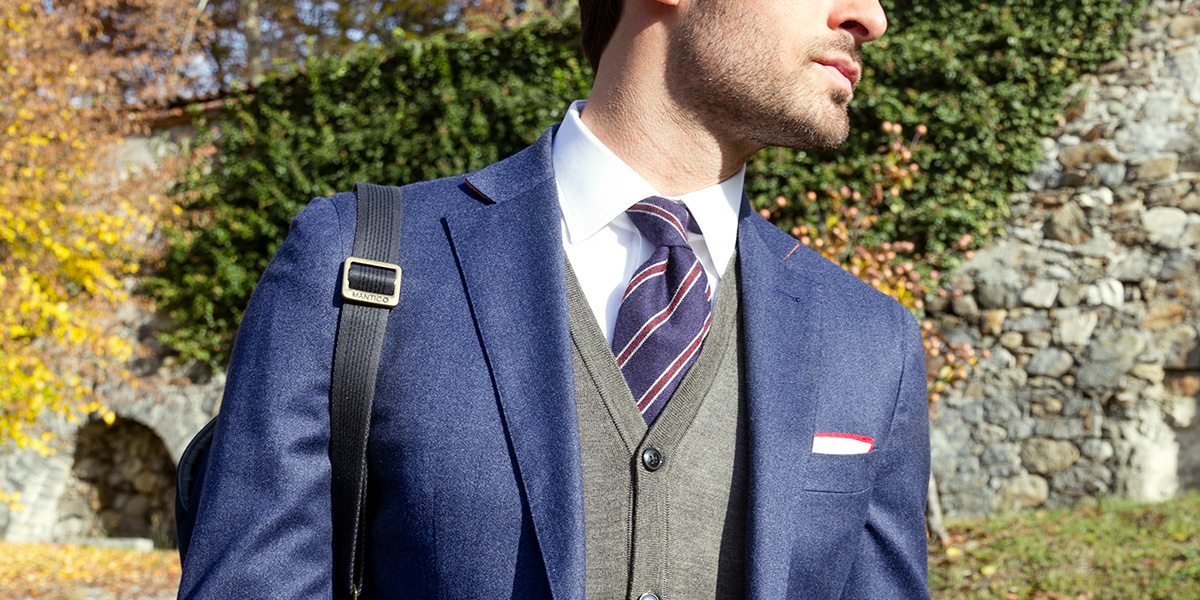
Wool ties, which are often cut from suiting cloth and are for cold Fall/Winter days. The patterns in the wool ties are mostly plaid, checks, polka dots and wide stripes in dark subdued cold colours. Shirts in cotton or wool (preferably a soft merino wool), plain or with subtle pattern pair perfectly with woollen ties.
Knit silk tie with which shirt
Knitted ties are at the less formal end of the neckwear spectrum and can be used to dress down with a casual shirt.

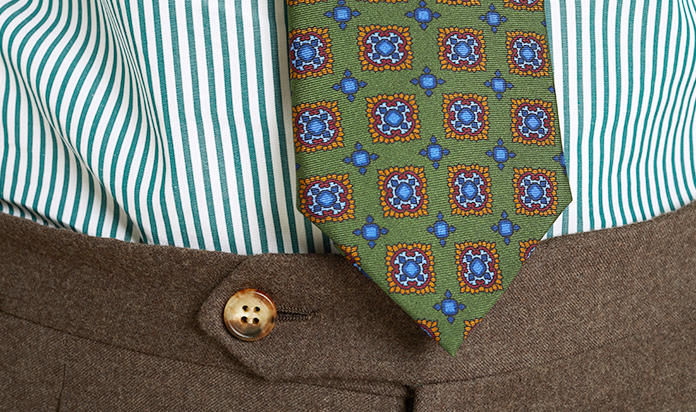
[…] In this regard we advise you to consult our guide on how to combine shirt and tie. […]